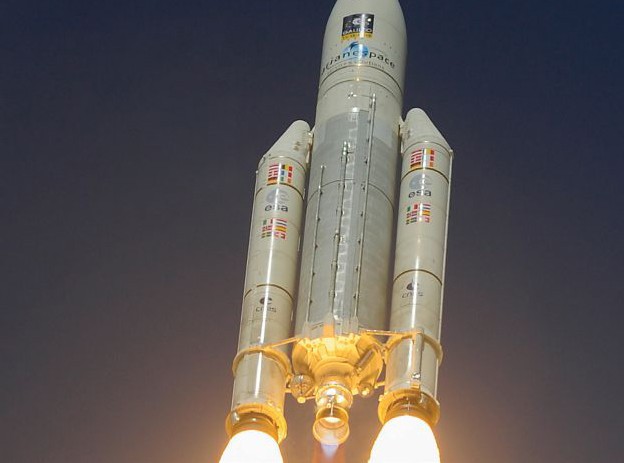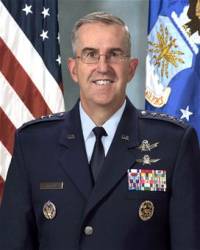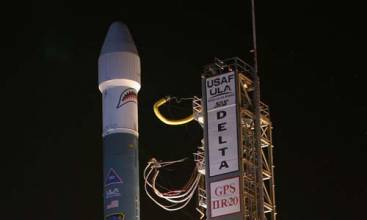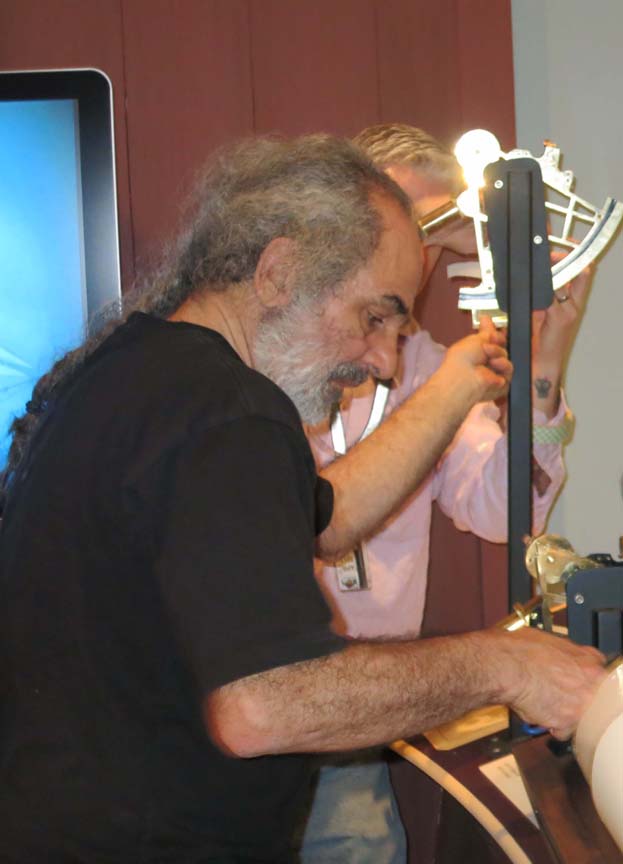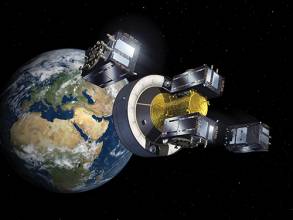Galileo Through the Lenses of Money, Defense, Brexit and Unfortunate Events
The year of our European correspondent generally begins with two predictive events: the ESA New Year press breakfast in Paris and the EU Space Policy Conference in Brussels. It’s a tough job but somebody’s got to do it.
European Space Agency (ESA) top brass welcomed journalists to the Agency’s headquarters in Paris for its annual New Year’s press launch. On hand was the Director General as well as ESA’s Galileo guru Paul Verhoef, who spoke one-on-one with Inside GNSS.
During his presentation to assembled journalists, ESA Director General Jan Wörner touched on a wide range of topics of interest to the Agency, from climate change to human exploration to budgetary matters and international cooperation, including a new agreement expected this year between ESA and the European Union.
About the European satellite navigation system, he said, “Galileo is operational, you can receive the Galileo data, and the accuracy, as I always hear, is three times better than the American GPS.” To his credit, Wörner made no e ort to steer clear of what was perhaps the most memorable, if the most infamous event of the preceding navigation year, when the Galileo signal went missing for several days last July: “The Galileo incident of course we took very seriously,” he said, “together with the European Commission and also with the GSA [European GNSS Agency]. We have looked into the details to avoid such an event again.”
The microphone passed to ESA’s Director of Navigation Paul Verhoef, who said, “In terms of Galileo, successively over the next years we will reach full operational capabilities, depending on which service we are talking about. There is an infrastructure element, which is the completion of the constellation; currently we still have to add a few satellites in order to come to a full operational constellation. We will have a few reserves in orbit and then we already start replacing the first satellites.
“With regard to the incident,” he went on, “obviously this is something nobody wants, and if it has happened nobody would want it to be repeated, so a big effort has been underway. There have been a number of independent investigations into the incident, one organized by the European Commission and another internally by ESA where we have our Inspector General and two former Inspector Generals doing an investigation. There was work undertaken by the GSA, and we are in contact with industry in order to look into all of the aspects, including technical design aspects, operations and the rest. All of this material is coming together and at the moment measures are put in place. The purpose is obviously that this can never, ever happen again. It is not nice to have any outage, and an outage for six days on a system like this is just not something that we set ourselves as acceptable.”
What Happened
Verhoef spoke to Inside GNSS after the press conference, describing a series of unfortunate events that led to the malfunction. “If we would have intervened at any point during the sequence, the thing wouldn’t have failed,” he said, “but we didn’t.” One of the problems, as Verhoef retold it, was that the two ground-based control stations were not able to provide the expected redundancy. The procedure in place at the time involved one center taking over the tasks of the other while refits, upgrades and other work was carried out. “So what you see is there is a constant handover of operational tasks between the centers and this was not necessarily robust enough.” But this was not the only problem. “There was also indeed a technical anomaly,” Verhoef said. “There was temporary equipment that was there because we were still in the initial deployment, and there was a problem with this equipment, and then there were operations mistakes. No, we had the whole thing. I say this not as an excuse, but Galileo is a complex system and we are still discovering some of the consequences of this complexity, and obviously we are now putting all efforts on further improving the robustness to make sure that this doesn’t happen again.”
NAVIS: Beyond the Earthly Sphere
Back at Wörner’s presentation, the General Director pointed out that Galileo and EGNOS are not the only areas of activity for the Agency’s Navigation section. “Of course at ESA we implement Galileo,” he said, “but in addition we have NAVIS, where here we are looking to not only to applications on the surface of the earth but also for outer space navigation systems.”
About expanding the reach of ESA’s navigation activities, Verhoef told us, “We consider that there are a number of tasks we can do in areas aside from our infrastructure delivery for European GNSS Galileo and EGNOS. With NAVIS, the Navigation, Innovation and Support Program, which we set up in 2016, we can do a number of other things that we feel are important in navigation.”
Verhoef said ESA is not looking to elbow in on the GSA’s work with downstream industry, “but there are a whole lot of activities and research projects among the scientific community using GNSS signals, and we have decided that we want to support them,” he said.
Through NAVIS, ESA is also working with its own member states that have navigation-related needs, and with actors in other application areas. “There are whole ranges of applications and receiver technologies which need to have a very close coupling to the functioning of the system,” Verhoef said. He cited the rail sector, where trains need seamless navigation services even while moving from above ground into tunnels. “You first need to decide how to use an application within the system in an optimal fashion. On our side, we can say to developers that we have a number of things we could possibly tweak on the existing navigation system to help them, and then, once that is done, they can go on and build their applications.”
Looking beyond the limits of global navigation, Verhoef said, “ESA Navigation, with our Exploration and Telecomms colleagues, and in coordination with NASA, are working together to design communications and navigation services for flights to the moon and for activities on the moon. We have two environments that we are looking at. One is more general navigation, but if you have, for example, robotic exploration on the moon then you also need rather precise navigation capabilities. Having permanent lunar infrastructure in place—we have already looked into this— is a lot cheaper than having every mission bringing its own capabilities. This means possibly satellites around the moon, infrastructure in The Gateway, possibly some stuff on the surface of the moon.”
The Gateway, as envisaged by NASA, will be a small spaceship in orbit around the Moon providing living quarters for astronauts, a lab for science and research, ports for visiting spacecraft and, importantly, access to the lunar surface.
Verhoef said ESA has done phase zero feasibility studies for a moon navigation system, and, “We are now going to move forward, continuing with system studies. Obviously our industry is interested. We will have to decide how these services are going to be provided, what the role of the private sector is and of the public sector. All that needs to be looked into, apart from technology aspects.”
Galileo II
While completion of the Galileo constellation is still a work in progress, ESA is already looking ahead to the system’s second generation. “Given the lead time on doing new things,” said Verhoef, “between the moment that you start thinking about it and then you determine how you want to do it and then you get the budget and you do the design and the procurement and the deployment, testing and qualification, you need to launch the satellites and upgrade your ground installations… there is about 15 years gone between the moment you start to think about it and the moment you’re actually able to provide a service to the public.
“We started on the second generation four or five years ago, the first ideas, first studies, first technology development. We have extensively talked to the member states and the GSA has looked into the wishes from the market.” Galileo II will proceed in steps, he said. “The first step we’ve already taken practically, which is the procurement of the transition satellites. They will be very advanced satellites with a lot of new capabilities.”
Verhoef said among those new capabilities will be increased flexibility: “We want to be able to reconfigure, even at the level of signals and at the level of power.” The current trend, he said, sees all GNSS moving towards delivering a more powerful signal that is more easily detectable, more robust, more difficult to interfere with and easier to process, thus saving processing power in smartphones and other navigation devices.
“Now, if we want more power, then the satellites need to be bigger,” he said. “And this brings the question of how you launch that. We are very likely going to go to electric propulsion, launching two satellites at a time, with a higher weight in a lower orbit in order to stick to the Ariane 62 capability, so that will be one of the design parameters. And with the capabilities we want, you probably will need intersatellite links.”
In all areas, he said, the key is responding to users’ needs. “For us, the proxy for the end users is the chipset manufacturers, who have now a number of years of experience with Galileo. For the moment we know that most chips are geared towards capturing GPS first and then Galileo as a second signal to help. We of course would like to put up a bit of competition to that, but for that we need to change the nature of our signals so that it is easier to capture a Galileo signal in the first instance.”
Verhoef pointed out that with Galileo II his team is not starting from scratch. “We’re going to have to change the system from its current operational capabilities to the new operational capabilities while we are in operation, so this is an extra complexity and it’s also going to cost more time. All of that is now being brought together and this year there will be a decision to go ahead with the second generation. Then we will formally kick off the start of the full procurement with a first availability of capabilities probably in the timeframe 2026-28.”
Brexit Nigh
The opening of ESA’s New Year came in the wake of a UK general election that appeared to finally seal the country’s departure from the European Union. But even as steadfast ‘remainers’ in the UK held out hopes that the ‘scission decision’ could still be reversed, Galileo had already moved on, having begun the process of peeling away UK participation in the program well in advance of the UK actually leaving the EU.
“Brexit does mean something to Galileo and it has already,” said Verhoef. “The UK industry is by and large out of the program, SSTL being one of the last ones still currently executing a contract.” As soon as Brexit kicks in, he explained, the UK will not have an agreement to participate in Galileo. “So that means for all new procurements, in principle, UK industry cannot participate unless there are particular reasons, for example because they are capable of doing something which in the rest of Europe is very difficult or impossible.
“The second issue is that there can no longer be access by the UK government, UK nationals or UK industry to Galileo PRS [Public Regulated Service] information. And as a result we have had to take out a number of British companies from the program. In general, companies were able to continue the contracts they had, but there is now only one contract which is still ongoing, the SSTL contract on payloads. Having said that, there are a number of classified tasks even on that contract which, after Brexit, will no longer be done by SSTL.” These tasks, he explained, will be taken over by a company on the continent, at the ESA ESTEC facility in the Netherlands, and from there the payloads will go to Bremen, to OHB for integration.
“That is the consequence, unfortunately both for the UK but also for us; it is a pity that we lose these capabilities,” Verhoef said. “And also, unfortunately, we are going to have to move a number of our own British ESA colleagues who are working on Galileo to other parts of the Agency, because they can no longer have access to classified information.
“It is not that this is specifically done for the UK, per se,” he said, “but it is the result of the rules imposed on us about what EU member states and those who have agreements with the EU, like Norway and Switzerland, can have access to, and what non-EU member states can have access to. The UK accepts all of these consequences because they were part of the EU member states who determined the rules.”
If Today is Tuesday, This Must Be Brussels
At the 12th EU Space Conference in Brussels, Thierry Breton made his first appearance as the new European Commissioner for Internal Market, and a remarkable appearance it was. In his position, Breton is charged with overseeing two of the European Commission’s Directorates General, that of Communications Networks, Content and Technology, also known as DG CONNECT, and Defense Industry and Space, also known, cleverly, as DG DEFIS. In French, defis means “challenges.” DEFIS is a freshly created DG under the new European Commission headed by Ursula von der Leyen.
Space Commissioner Breton arrived at the event with some fanfare and started his presentation with a jaunty air. “I could speak French but I think it’s best if I speak English,” he teased, “even if, not yet but early next month, we will have only 4.8 million inhabitants in Europe for whom their home language is English,”—referring to the Irish—“and for the 504 million remaining citizens it will not be English.”
Once upon a time the lingua franca, literally the French language, was the most popular lingua franca, the common language spoken among people who speak different languages, at least in Europe. With the rise of the Anglo- Saxon hegemony in the last century, English has become the more common common language in many international arenas, including that of EU Space.
Breton suggested, without saying the word Brexit, that some adjustments might need to be made, some other modes of expression explored. And then he did, after all, continue in English.
Teasing Aside
Breton apologized for missing his earlier scheduled time slot at the conference, explaining that he had had to be in Davos in the meeting in which President von der Leyen faced off with Donald Trump. It has been reported that the American President later said the EU was more difficult to do business with than China.
Breton promised to explain why he is not happy. This focused the room’s attention. “You have achieved a fantastic success, I’m extremely impressed, to tell the truth, proud. Galileo, EGNOS, Copernicus, thanks to all of you, we did it.”
Specifically about the European flagship GNSS program, he said “Galileo is now up and running for more than two years. I remember the skepticism at the beginning when this program was launched. While still in its initial service mode, the accuracy of Galileo is beyond what was expected by many, including our American friends.
“Of course we continue to develop Galileo, we have more than one billion users on the planet and this number is growing every day.” Breton said his objectives included continuing deployment in order to reach the full operational capacity as soon as possible, continuing to improve precision and preparing the second generation of Galileo, to stay ahead in the technological race.
“Of course, the transition batch procurement is ongoing,” he said, “and we will also ensure the smooth development of encrypted signals, because Galileo is also a strategic asset designed to be also in use for military and not only civil security purposes.
“I will come back on some governance issues we may have but right now I’m still on the good news part.”
“We need to do more, but differently. It’s a lot of money that we’ve put on the table, so we will need to do a lot of work, but differently. We are not in a business-as-usual environment or mode any longer.”
Money, Honey
The EU is in the midst of a big-time wrangle over its 2021-2027 Multiannual Financial Framework: the EU budget. The slice of the pie that will go to the EU space programs is still very much up in the air. Various actors have expressed concern about those programs, including Galileo, potentially not getting what they need to meet their objectives, including those enumerated by Breton.
Recently cited low-side numbers, some billions short of what the space programs are asking for, were put forward last year by the then-presiding Finnish EU Presidency. During the Space Conference in Brussels, Timo Pesonen, new Director General of DG DEFIS and who also happens to be Finnish, was asked what his compatriots were thinking. He answered, “I can’t read minds so I don’t know what was going on in the thoughts of the Finnish representative when he was proposing this budget, which doesn’t seem to make a lot of sense to me.”
Any way you slice it, there is likely to be some belt-tightening going on across the Union in the coming months and years, with the imminent British pullout bound to have an impact on budget figures, and with some member states reportedly unwilling to increase their spending in order to make up the shortfall.
Breton said, “I just saw my colleague, Commissioner Hahn [Johannes Hahn, Budget and Administration] to make sure that we will be totally in line with the negotiation. It will be tough. You can count on me. It’s extremely important and, by the way, in exchange I will give the commitment that we will do more with what we receive from our taxpayers and the member states. I have some ideas about how we could use the money and the way we could work together.”
On the question of European defense, he said, “Space is an enabler of security and defense. Galileo has a defense dimension. I know very well that this has been a taboo for Europe for a long time. One of the big achievements of the Commission has been to establish this European Defense Fund. We need to handle more and more of our defense together. But we know also that each of the member states has its own history, culture. It’s a complex subject but we need to move forward.
“Now let’s come to one of my favorite subjects—governance.”
Fact-Finding Mission
Much has been written about the unfortunate occurrence of July 2019, when the Galileo signal went dead for several days, and no one stepped up to account for the failure.
The general sense now has been that one need no longer harp on the incident. It was really bad, it was embarrassing, there has yet to be any real accountability, but just let it go. As eggshells no longer strew the ground, we can walk about freely once more.
Therefore, a real sense of uneasiness mounted as Breton inched towards that subject throughout his presentation. And then he arrived.
“In order to develop our strategy,” he said, “we need to work differently, and I’m ready to spend a lot of time with each of you, first to understand what went extremely well in the past, and I already mentioned a lot of success. If we had in the past some errors, to understand why, we have already started, lessons learned are already extremely important, in order to correct what has to be corrected.
“The good news is that I am an outsider, which is not your case, so you will benefit of my fresh eyes. Some things that I have understood and discovered are just not acceptable, are not acceptable any more, and if we want to be successful we have to invent a new way to work together—the Commission of course, national space agencies, ESA [European Space Agency], GSA [European GNSS Agency], industry.”
Readers will know that the governance issue, the governance problem, involving the EC, ESA and GSA is not a new subject. Indeed, ‘We’re going to fix EU Space governance’ it is an old and familiar tune.
“I will come back to the governance issue that we had in July. I start to understand what happened. I’m not yet sure one hundred percent of the responsibility, but I will discover. And then, my job will not be to punish anybody but to propose, so that this will not happen again. When I saw this news, Galileo, no service for one week, ah! one billion users. You know what was my first reaction? The system has been hacked! But no, the good news is that it was just because we worked badly. Thank god, we will be able to fix it.
“But we will have also to change some rules, because I gathered when I was discussing—I wanted to deep dive everything you do—someone said ‘Commissioner we provide services, so we need to have a zero default, and you have industry where you need to have a zero default. Yes, but you know we are still in development.’ Come on! ‘No, no, no, we are still in development so we have excuses.’ No! I don’t care, we are providing services now! We have to change this, huh? We are providing extremely critical services to our European fellows and industry. Zero default, this is the level that we need you to reach. Everybody understands that what you are doing is absolutely critical for Europe and for our interest and our sovereignty, so we will have to make more robust everything that we are doing.”
Brexit: Feeling the loss
In a more somber tone, he continued, “We are seeing already some of the elements that we will have to cope with because our British friends decided to leave Europe, and of course we are all very sorry. It isn’t what we wanted, it’s a fact.”
Brexit represents a great loss for many people across Europe and the British isles. Whatever the economic, sociopolitical or cultural outcomes, however history will record the withdrawal of the UK from the European Union in decades to come, at the human level it now entails real separation. Colleagues, old friends, are taking leave of one another.
“We have to respect the will of the British voters,” Breton said, “of course, and we will respect it.” The room was quiet as he paused, his head slightly bowed. Tears may or may not have dropped in that room at that moment, but tears have fallen and will fall as time rolls on, as those old friends look longingly across the windswept waters of the north and remember.
“We will need to work much more together,” Breton said, “and especially in your field. You will get everything you need, and you will change your habits. You will share much more data, use much more HPC, AI, and work differently with other colleagues, maybe not coming from the space industry, but who will help you to do what you have to do. Without these interconnections, no future, you know it and I know it.”

